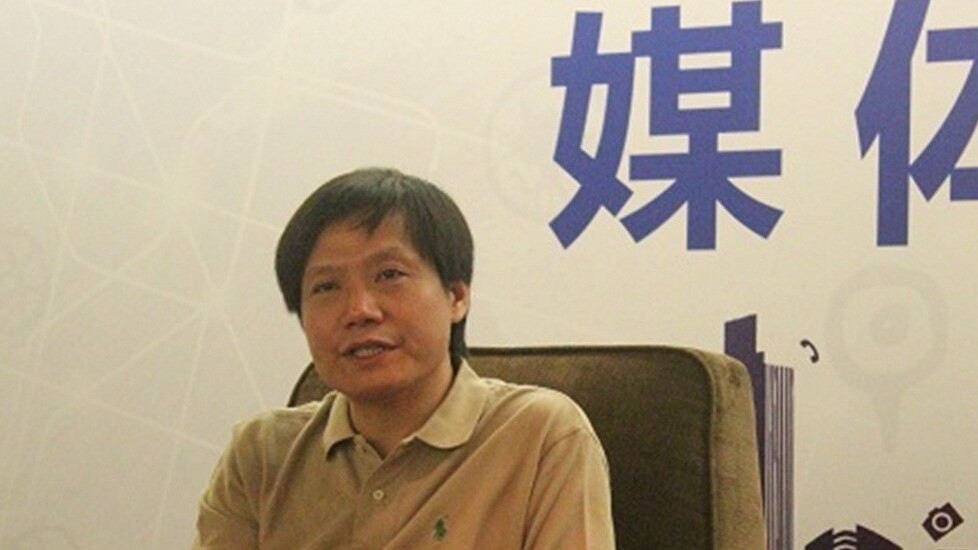
Lei Jun is something of a celebrity, if not a cult icon, in China. He’s the CEO and founder of Xiaomi, a fast-growing company that you’re sure to hear a lot more about outside of China this year.
Xiaomi’s competitively priced phones are sold in batches that, when released in phases, regularly sell out in quick time, often within half an hour. Despite its first device being released as recently as 2011, its users are fiercely loyal to the phones, which are build on the company’s own highly customizable Android-based MIUI firmware.
Speaking to AllThingsD last month, Jun said he expects the company to sell 15 million devices this year. Though it is double the numbers for 2012, that ambition is achievable and is very much a mark of Xiaomi’s status; it’s also all the more impressive given that it sells phones only in China, for now.
But success inevitably follows speculation, comparisons, and criticisms, which Jun addressed in a media interview at the Global Mobile Internet Conference in Beijing today.
Why two phones, not one?
With Xiaomi’s second generation phone under its belt, expectations are hyped for its third-generation Mi phone. Jun took to the stage at the launch last month and quashed speculation when he announced, rather unexpectedly, two new phones called the Mi-2A and Mi-2S.
Jun’s explanation for the two-phone strategy is as you may think. Xiaomi is expanding its line of phones that hit more than one price-point to target two core customer groups. The Mi-2S is an “enhanced” version of the Mi-Two, and Jun says that, at a cost of $370 (2299 RMB), students are its primary target. The Mi-2A is a “simplified version” that hits a lower price point, selling for $241 (RMB 1499).

Explaining its ‘international expansion’ plans
For some time now there’s been speculation that, after 18 months serving China alone, the company is ready to expand internationally.
The company has already said that it will launch devices in Hong Kong and Taiwan soon, and that has fed rumors suggesting that it would also target the rest of Asia, Europe and the US.
Speaking today, Jun brushed off that speculation, saying that Xiaomi’s move into Hong Kong and Taiwan is a test of new markets, not an indication that it will push out worldwide. For now, the ideal of going global is something it is thinking about but not with any pressing immediacy.
Given the comparatively high income levels in Taiwan and Hong Kong — where HTC, Lenovo, and Samsung phones are selling like hot cakes — Jun says the ‘expansion’ plan is merely a clever strategy for Xiaomi to pit its phones against top-tier competitors in small markets and see how they fair.
It’s safe to say that should Xiaomi expand, the company has its core business strategy figured out. Unable to rely on unit sales since it subsidizes each phone sold, the company has three core business competencies: e-commerce — the sale of accessories on its website — deals with telecom operators, and the sale of “Internet services”, such as games.
The new devices were launched just over a month ago and already Xiaomi is selling between 200,000 and 300,000 units each week with more than 2 million prospective buyers waiting to snap up a phone. Much of that demand may be down to Xiaomi’s unique distribution system — the company makes a limited number of handsets available every Tuesday morning each week — but, regardless, demand for Xiaomi devices remains high.
Jun doesn’t provide exact sales numbers for the new devices — basic maths suggests the Mi-2A and Mi-2S are near, or past, 1 million cumulative sales already — but he does add that a whopping 72 percent of Xiaomi phones are purchased through its website. The remainder are sold via operators, for those buyers that prefer to frequent a physical location.
Earlier this year, the firm also launched Xiaomi Box, its stream-to-TV set top box, which Jun says is selling “well” and receives “positive” feedback.
A different company to Apple
Xiaomi is expectedly compared to Apple on a regular basis, with some even criticizing it for being an Apple clone. Jun says that he has the utmost respect for the US company, and even admires it, but he clarifies that his goal is to “create a company different from Apple”. Adding, “I don’t believe anyone can copy Apple”.
The distinction comes down to Xiaomi’s two-pronged focus. The company began developing its MiUi software before branching into hardware, and Jun says it remains “a mobile Internet company”. Apple, on the other hard is a hardware firm, although it has moved into software and services, it comes from an entirely different approach.
Likewise, the manner in which Xiaomi builds its software is different. Apple’s mobile and Mac designs are developed behind closed doors and without no customer input, but Xiaomi relishes and embraces user feedback. “Fans are a huge part of me,” says Jun.
Jun points out that new MiUi updates are pushed on a weekly basis and many include changes or additions that result directly from the contribution of its users. For instance, if you’re recording a conversation using the iOS’s recording feature, a call would interrupt and pause the recording. MiUi 5’s voice recording app, thanks to the collaborative input from journalists using MiUi, continues recording through a call without interruption.
There’s a benefit to listening and improving the user experience based on user feedback, Jun points out. If you pay attention and make changes that fulfil a user’s request, it can make users excited and passionate about products, giving them a sense of achievement and belonging. That type of participation is particularly powerful, since it ends up involving not only the user, but their friends, family and others through word of mouth.
Nonetheless, with its loyal and passionate fanbase and attractive, powerful devices, the original comparison with Apple does have some ground, albeit merely at surface value.
Read our other interviews and news from GMIC 2013 here.

Get the TNW newsletter
Get the most important tech news in your inbox each week.






